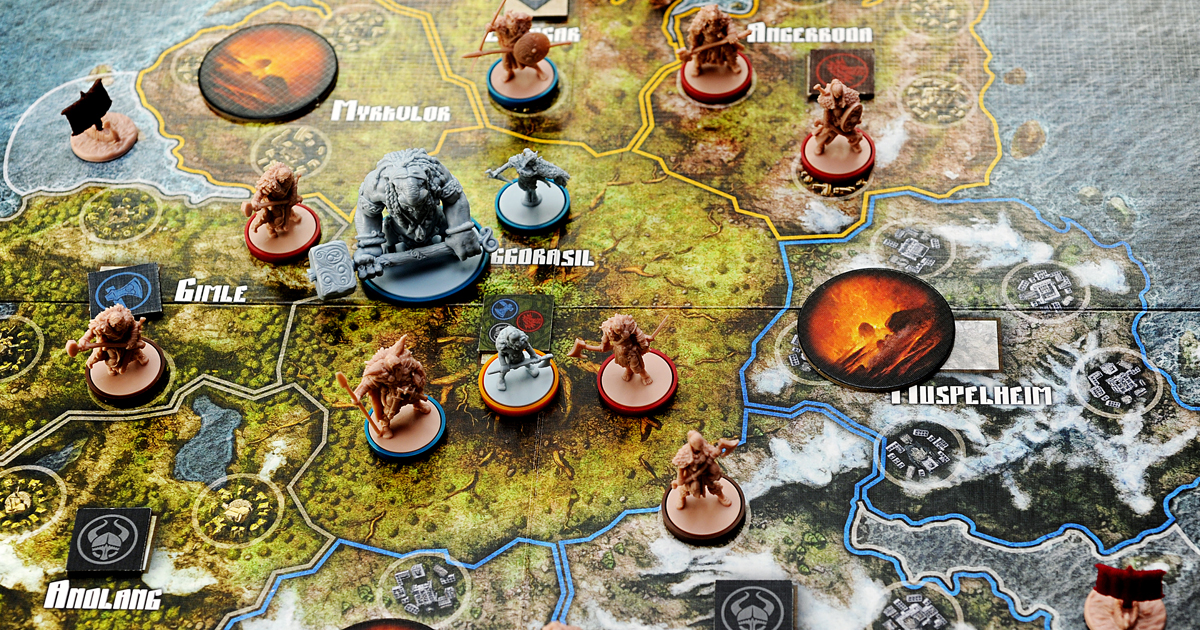CMON Feature Friday: Board Game Dictionary #3
We’ve had a lot of fun the last couple of weeks defining some commonly used board game terms. We’ll do more of these in the future, but to close out this series, we decided to go with some of our readers’ suggestions for definitions.
For this week’s CMON Feature Friday we are defining some of the terms you asked for!
Dudes on a Map
This is one term where the majority of the information is in the name, but we’re going to define it, anyway. A Dudes on a Map game (or DOAM) refers to a game where the main board is a map and players have some miniature figures representing them on said map. This are often area control, or area majority games, but really, the mechanic is less important than the components. Maps can represent our world or enter into sci-fi or fantasy realms. As technology has improved, so too has the quality of the miniatures you find in modern board games. Miniature figures on the board are getting better and better, adding to the popularity of these games. Likely one of the reasons DOAM games are so well received, is the fact that they are easy to read. We can innately see what is happening on the board and make our gaming decisions based on the straight-forward board state.
King Making
Losing stinks, but we’re all going to lose at some point. How we behave when we’re going to lose can define what kind of a gamer we are. King Making refers to player who is going to lose a game, but through their actions (or sometimes, inaction), they determine the winner. You may be faced with a situation whereby you could choose to attack another player, handing the victory to a third opponent. Or you could not make an obvious move, thus allowing another player to take advantage and win the game. So, how do you avoid being a King Maker? The best thing to do is to just play as if you’re going to win. No matter the situation, make the move that will garner you the most points, advance you furthest on the track, earn you stacks of cash, etc. It may mean that your move does help someone else, but if you’re playing optimally for your own game, it can hardly be considered King Making.
Deckbuilding Game
Deckbuilding games have gained popularity over the past decade, to the point that they’re being integrated in with other mechanics. You now often hear that a game has a deckbuilding element to it, rather than that being the sole focus of the game. In a Deckbuilding Game, players start with the same fairly weak deck of cards. They will buy new cards from a common pool and discard them to their personal discard pile. Once their crappy starter deck has been exhausted and must be shuffled, the new, more powerful cards will start making their way into the players’ hands, allowing them to have more dynamic turns and acquire even better cards. Now, in a deckbuilder, you can have a perfect strategy and still not get the cards you need when you need them, but the law of averages says that the better you construct your deck, the better you’ll do, overall. Designers have taken the deckbuilding mechanic and used it with dice, or chips, or other components, but it was used first with cards.
Mulligan
A do-over, a second chance, or a mulligan. Call it what you will, but it amounts to the same thing: an opportunity to try a move over again when something goes really wrong. The original term mulligan is a golfing term, traced to Canadian golfer David Mulligan. There are some varied stories about how it came about, but it amounts to Mulligan taking a second tee shot after a cruddy first one. In gaming, mulligans have more to do with being able to take a turn back and do something different. Lots of gaming groups will have their own rules for this. For example, some will allow you take back a move if the next player hasn’t taken their turn. Some will be even more flexible, allowing for moves or mistakes to be altered later in the game. Some are quite strict, never allowing players to change a move once it’s been made. A pretty good rule of thumb is to let people get away with a few more do-overs when they’re new to gaming, or it’s the first time they’ve played that game.
So, there you have it. Four more board game terms defined for you. We’re going to return to our more regular CMON Feature Friday articles after Gen Con, but if you enjoyed these Board Game Dictionary entries let us know and we’ll bring them back in the future.
